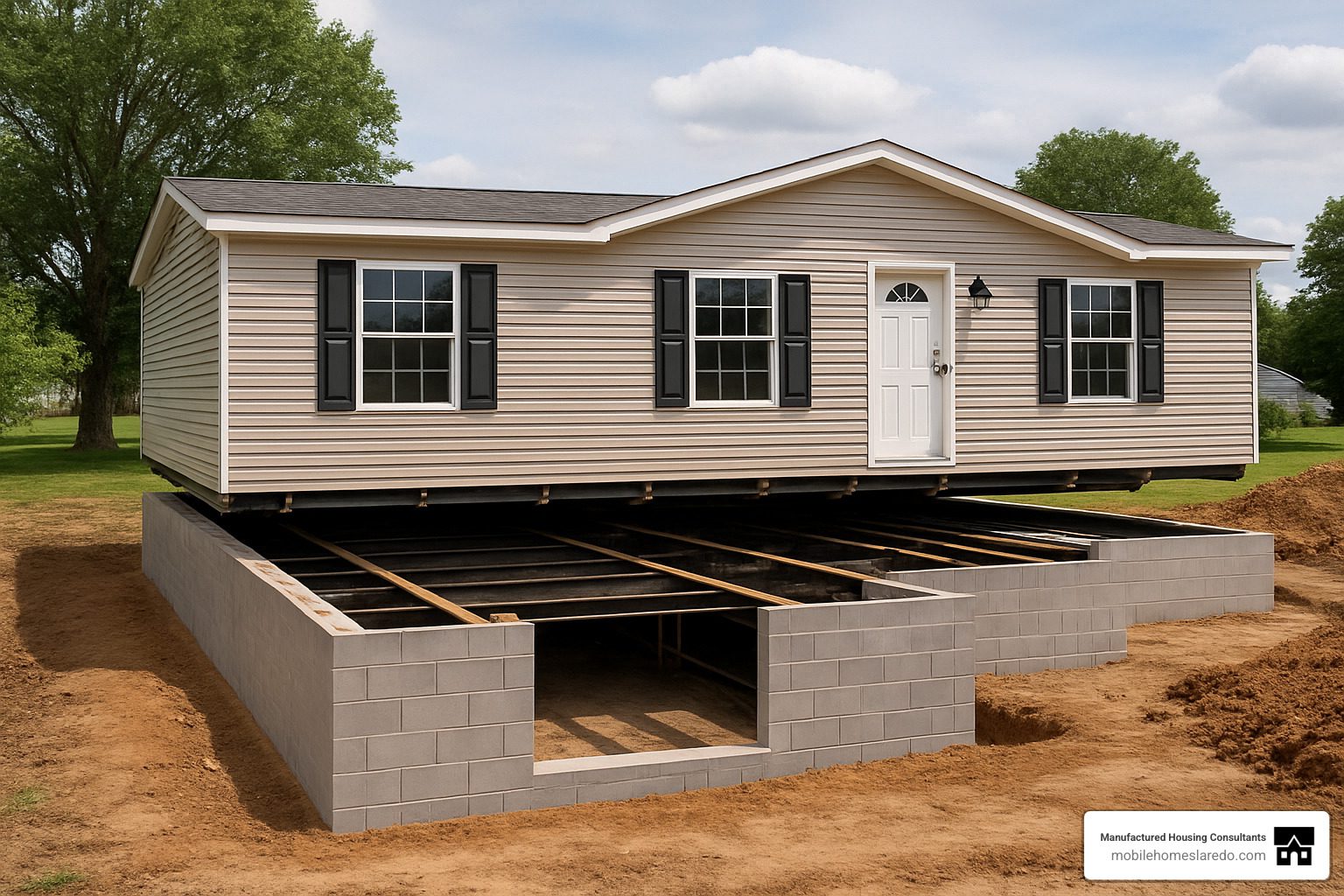Why Your Double Wide Foundation Choice Determines Everything
Double wide mobile home foundation options directly impact your home’s stability, financing eligibility, and long-term value. Here’s what you need to know:
Main Foundation Types:
- Slab Foundation: $4,000-$8,000 – Concrete pad, permanent, good for flat lots
- Pier & Beam: $1,000-$2,000 – Most affordable, allows access underneath
- Crawl Space: $6,000-$15,000 – Liftd, good drainage, storage space
- Basement: $12,000-$25,000 – Most expensive, adds living space
- Runner Foundation: $2,000-$8,000 – Continuous concrete strips
- Pit Set: $2,000-$6,000 – Low-profile, looks like site-built home
Key Requirements:
- Must meet HUD standards for manufactured homes
- Permanent foundations required for FHA/VA loans
- Proper anchoring prevents wind uplift damage
- Site preparation includes soil testing and grading
Double-wide mobile homes typically measure 20 to 36 feet in width and 32 to 80 feet in length, requiring specialized foundation design to handle their size and weight distribution. The foundation you choose affects everything from your monthly mortgage payment to your home’s resale value.
Your foundation decision impacts more than just initial costs. Permanent foundations made from concrete, mortared masonry, or treated wood qualify for conventional mortgages with better interest rates. Non-permanent foundations like basic pier systems limit your financing options but cost less upfront.
As one Texas homeowner finded after ignoring soil conditions: “We saved $3,000 on our foundation, but spent $8,000 fixing settlement damage two years later.” This guide helps you avoid expensive mistakes while finding the right balance between cost and quality.
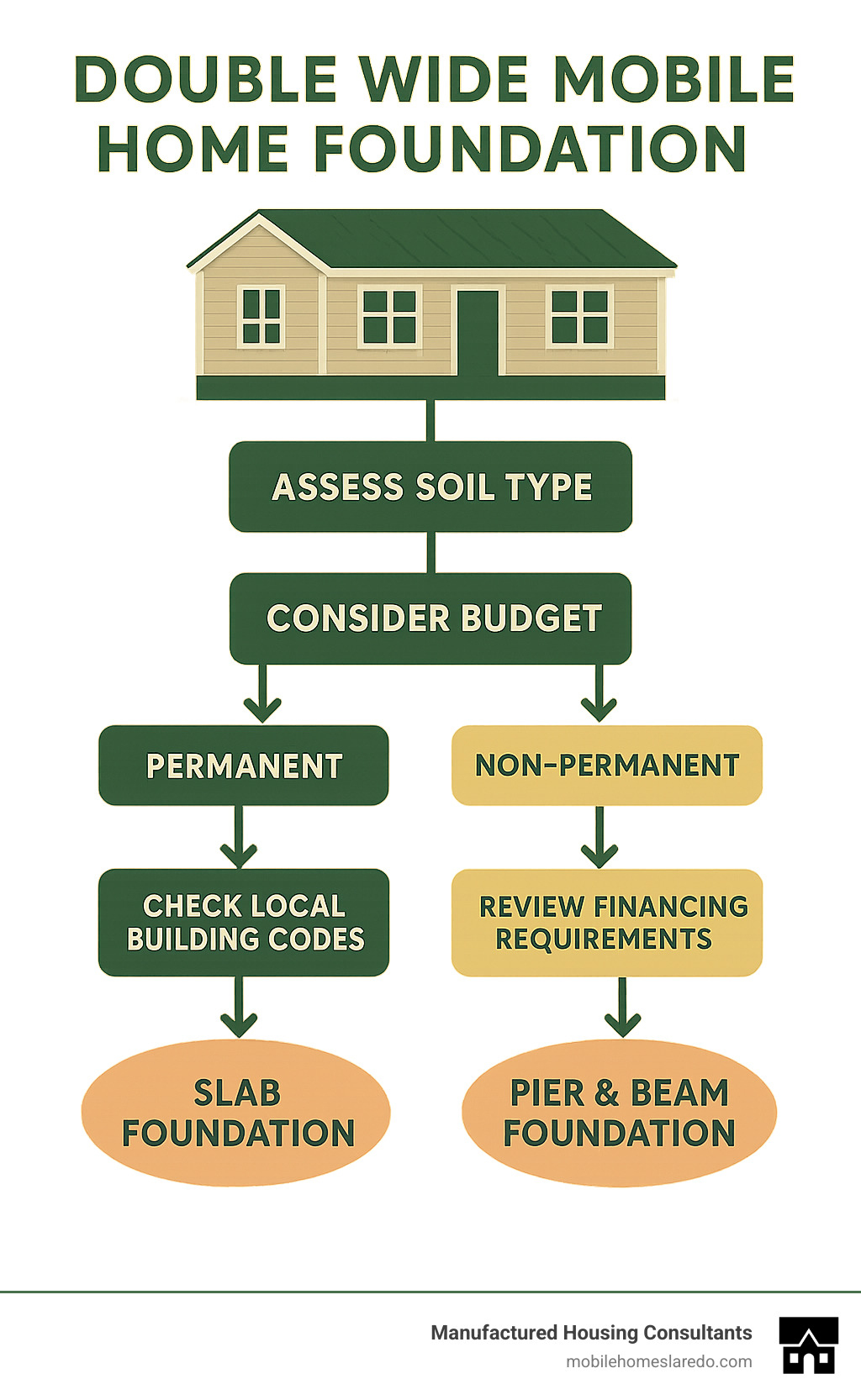
Double wide mobile home foundation terms to know:
- types of foundations for mobile homes
- skirting for manufactured home
- what type of plumbing is used in mobile homes
Mastering Double Wide Mobile Home Foundation Choices
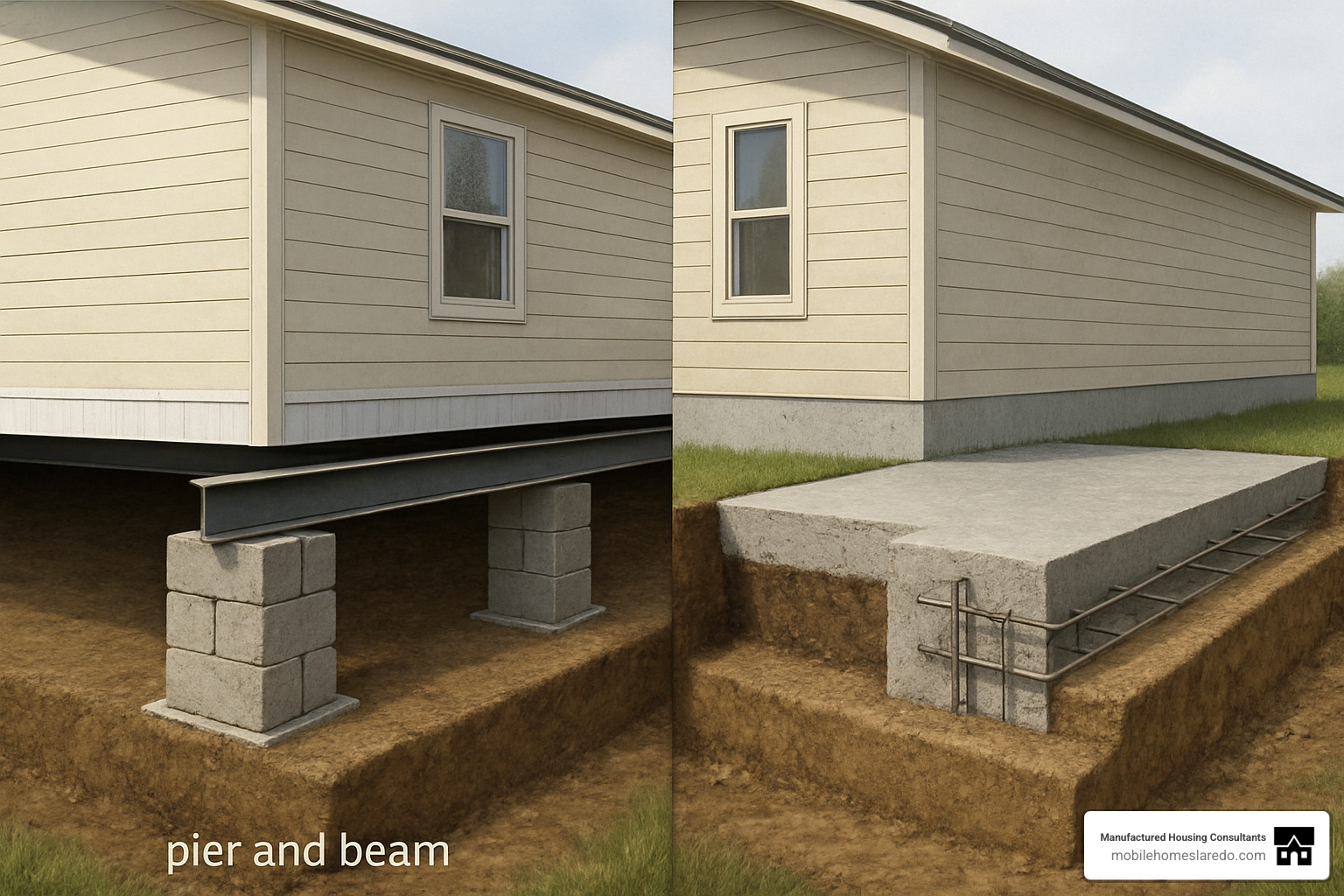
Your double wide mobile home foundation choice gets more complex than single-wides because you’re dealing with a much larger structure. These homes typically span 20 to 36 feet wide and up to 80 feet long, creating unique challenges at the marriage line where two sections connect.
The foundation system must handle serious forces. Wind loads can reach 110 mph in Texas coastal areas, while live loads range from 40 to 100 pounds per square foot. Add in potential seismic forces, frost heave, and flood resistance requirements, and this becomes a critical decision.
Soil conditions play a huge role. According to research on foundation performance, clay soils can expand and contract dramatically with moisture changes. Sandy soils drain well but may need deeper footings for stability. Smart homeowners always start with proper soil testing.
Structural requirements get specific fast. Pier spacing typically runs 6 to 8 feet on center, with minimum 18-inch clearance under I-beams in Texas. You’ll need both vertical and lateral anchoring systems plus adequate support for utilities and HVAC equipment.
Here’s how the main foundation types stack up for double-wides:
| Foundation Type | Cost Range | Installation Time | Flood Resistance | Frost Protection | Seismic Performance |
|---|---|---|---|---|---|
| Slab | $4,000-$8,000 | 1-2 weeks | Excellent | Good with insulation | Excellent |
| Pier & Beam | $1,000-$2,000 | 3-5 days | Good | Requires frost-line footings | Very Good |
| Crawl Space | $6,000-$15,000 | 2-3 weeks | Excellent | Good | Good |
| Basement | $12,000-$25,000 | 4-6 weeks | Excellent | Excellent | Good |
| Runner | $2,000-$8,000 | 1-2 weeks | Good | Fair | Fair |
| Pit Set | $2,000-$6,000 | 2-3 weeks | Poor | Good | Fair |
Double Wide Mobile Home Foundation Types & Costs
Slab foundations ($4,000-$8,000) work beautifully for double-wides on flat, well-drained sites. You’re looking at a 4 to 6-inch thick concrete pad with 3,000 to 4,000 psi strength, reinforced with rebar or wire mesh. The process includes excavating, adding gravel base, installing vapor barrier, placing reinforcement, and pouring concrete with embedded anchor bolts.
Pier and beam systems ($1,000-$2,000) offer the most economical option, using concrete blocks or steel piers under your home’s main I-beams. For double-wides, you’ll typically need 12 to 16 pier locations with concrete footings below the frost line. While affordable, pier systems require regular maintenance and may not qualify for conventional mortgage financing.
Runner foundations ($2,000-$8,000) create continuous concrete strips under the home’s perimeter and main support beams. These 12 to 16-inch wide runners extend below the frost line, offering more stability than individual piers while costing less than full slabs.
Crawl space systems ($6,000-$15,000) create partial basements with concrete or block walls. The 48-inch depth provides excellent utility access and storage while elevating your home above flood levels.
Basement foundations ($12,000-$25,000) add significant living space but require extensive excavation and waterproofing. In Texas, they’re less common due to soil conditions but provide the highest resale value.
Pit set installations ($2,000-$6,000) place your home close to ground level by excavating a shallow pit. While attractive for their site-built appearance, they’re vulnerable to water issues.
Cost drivers include regional labor rates, soil conditions requiring special preparation, permit fees, utility connections, and site accessibility.
More info about foundational options provides detailed specifications for each system.
Permanent vs. Non-Permanent Foundations for Double Wides
The difference between permanent and non-permanent double wide mobile home foundation systems affects financing options, insurance rates, and resale value for decades.
Permanent foundations must meet HUD requirements with durable materials like concrete, mortared masonry, or treated wood. They require removing transportation components like tongue, axles, and wheels, making your home a permanent part of the property.
The HUD certification process requires a licensed professional engineer to verify compliance, opening the door to conventional mortgage financing with better interest rates.
FHA and VA loans require permanent foundations, period. More info about FHA requirements explains government-backed loan requirements.
Permanent foundations allow real property classification, affecting property taxes (often lower rates), insurance options (homeowners vs. mobile home insurance), financing access (conventional mortgages), and resale value with higher appreciation potential.
Non-permanent foundations cost less initially but limit your options with mobile home loans at higher interest rates, limited appreciation potential, and resale challenges.
Site Prep, Blocking & Installation Steps
Proper site preparation makes the difference between a double wide mobile home foundation that lasts decades and one causing expensive problems.
Soil testing determines bearing capacity, drainage characteristics, expansion potential, frost depth requirements, and groundwater levels – guiding every other decision.
Site preparation follows a specific sequence: clear and level the site, grade for drainage with minimum 1/4 inch per foot slope, compact subgrade to 95% compaction, install utility rough-ins, and survey exact placement locations.
Foundation installation varies by type. For slab foundations: excavate to required depth, install and compact gravel base, place vapor barrier, set reinforcement, pour concrete with proper strength, embed anchor bolts, and cure minimum 7 days.
Pier systems require marking locations, excavating footings below frost line, pouring concrete footings, installing piers, leveling with adjustment mechanisms, and installing anchor straps.
Blocking and leveling ensure stability: use solid cap blocks, maintain proper clearance, install perimeter support, space piers correctly, and fill gaps with paired wood shims (maximum 1 inch).
Proper tie-downs prevent wind damage with straps every 6 to 8 feet, anchored to concrete deadmen, using certified equipment at proper angles.
More info about mobile home installation provides detailed checklists for each phase.
Maintenance, Financing & Common Pitfalls
Your double wide mobile home foundation needs ongoing attention to perform reliably for decades.
Annual maintenance should include checking for cracks, verifying pier alignment, inspecting anchor straps, testing level, and examining skirting for damage.
Moisture control prevents most problems: clean gutters quarterly, ensure proper drainage, check vapor barriers, monitor humidity below 60%, and seal cracks.
At Manufactured Housing Consultants, we work with multiple lenders to help Texas homeowners secure the best financing. Our FICO Score Improvement Program helps buyers qualify for better rates.
Financing options include conventional mortgages (permanent foundations only), FHA loans with certification, VA loans for eligible veterans, manufactured home loans for non-permanent foundations, and personal loans for upgrades.
Common mistakes cost thousands: ignoring soil conditions leads to foundation failure; code shortcuts result in failed inspections; under-budgeting causes higher long-term costs; poor drainage causes water damage; inadequate anchoring results in wind damage.
Energy efficiency improvements include insulating slab edges, sealing crawl spaces, installing proper ventilation, using reflective barriers, and ensuring HVAC ducts are sealed and insulated.
More info about delivery & set-up costs helps you budget for complete installation.
Build With Confidence & Save Money
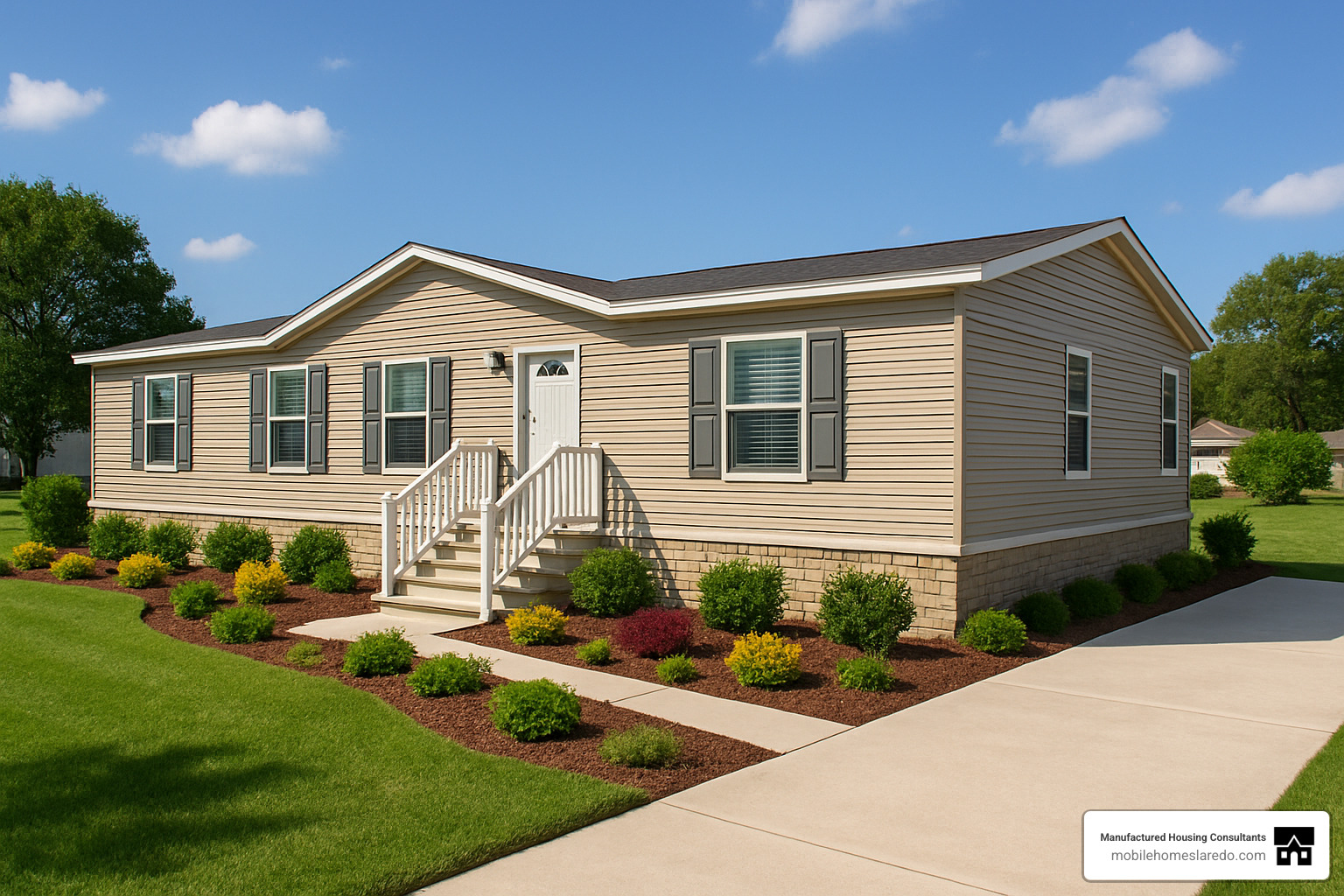
Getting your double wide mobile home foundation right the first time transforms your housing investment from a worry into a source of pride. Smart foundation choices pay you back every month through lower mortgage payments, reduced insurance costs, and peace of mind.
The Financial Payoff Is Real
Permanent foundations provide access to conventional mortgages with interest rates often 2-3% lower than mobile home loans. That difference saves most Texas families $200-400 monthly on house payments.
Homeowners insurance typically costs 30-50% less than mobile home insurance because permanent foundations dramatically reduce wind and water damage risks. Plus, real property tax treatment often means lower annual tax bills.
Permanently installed double-wides appreciate more like site-built homes. One San Antonio customer saw his home value increase $35,000 over five years – largely due to smart foundation choice.
Living Better Every Day
Proper foundations make life more comfortable. Floors stay level, doors close properly, and energy bills stay reasonable because your home seals tight against Texas weather.
Foundation maintenance becomes almost effortless with permanent installations. No more annual re-leveling visits or pier adjustments. Just basic upkeep like checking drainage and keeping gutters clean.
Before finalizing foundation decisions, ensure you’ve covered essentials: soil report completed, local permits in hand, contractor properly licensed, materials meeting HUD specs, anchoring system rated for local winds, drainage plan addressing your site, utilities coordinated, and inspection schedule confirmed.
Why We Make This Easy
At Manufactured Housing Consultants, we’ve guided hundreds of Texas families through foundation decisions. Our guaranteed lowest prices on foundation-ready homes from 11 top manufacturers means you get quality without overpaying. Our specialized financing programs work with all credit types, and our FICO Score Improvement Program helps you qualify for better conventional mortgage rates.
Being located in Laredo gives us deep knowledge of Texas soil conditions, local building codes, and climate challenges. We work exclusively with certified contractors and engineers who understand both HUD requirements and local regulations.
Our team handles everything from choosing the right foundation type based on your site and budget, through final inspection. No surprises, no hidden costs, just professional guidance protecting your investment.
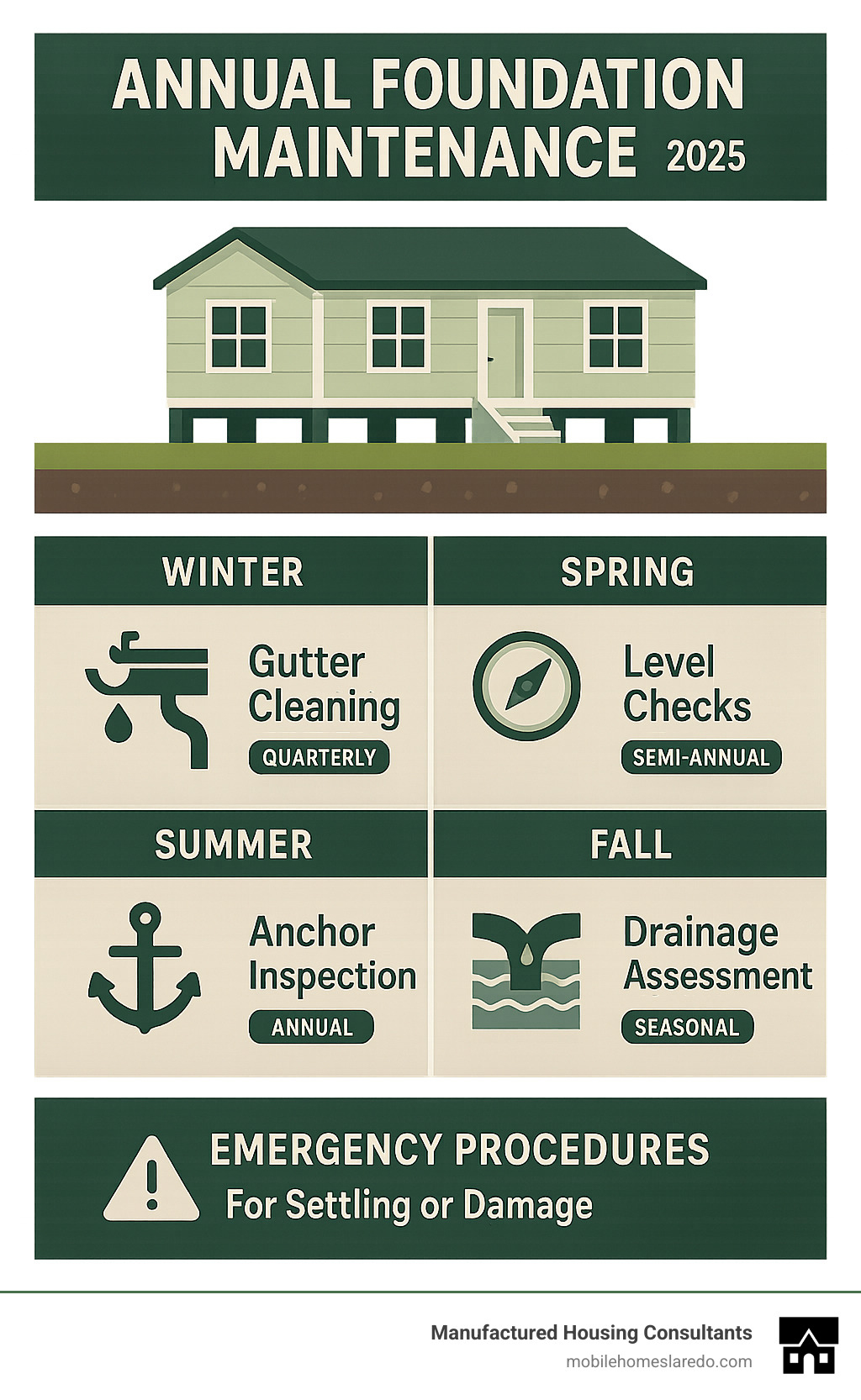
Your Next Steps Are Simple
Start with site assessment – get soil testing done and evaluate drainage needs. Budget planning comes next, including foundation costs in your total investment. Then choose your foundation type based on site conditions, financing goals, and long-term plans.
Once you’ve got the foundation figured out, selecting your home becomes the fun part. More info about double-wide models shows our current inventory of quality homes ready for professional installation.
The final step is coordinating installation with certified contractors who do this work right the first time. We handle those connections, ensuring your double wide mobile home foundation gets built to last.
Don’t let foundation decisions stress you out. With solid information and the right team supporting you, this process becomes straightforward. The foundation choice you make today determines your comfort and financial success for decades.
Ready to move forward? Explore our foundation-ready homes and find how we make homeownership both affordable and worry-free for Texas families. Our team is standing by to help you find the perfect combination of home and foundation that fits your needs and budget.
Your dream of stable, affordable homeownership is absolutely within reach. Let us show you how the right foundation choice makes all the difference in your happiness and financial future.

